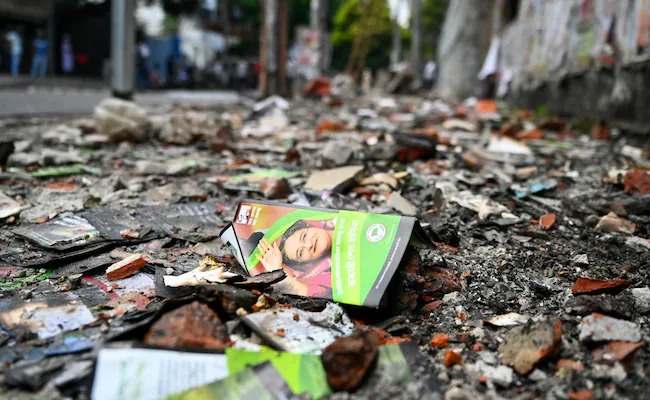
Table of Contents
The indefinite closure of Indian Visa Application Centres (IVACs) in Bangladesh has become a significant development, highlighting the deep political and social turmoil currently engulfing the country. The Indian government’s decision, made public on August 8, 2024, to shutter these centres until further notice stems from the escalating violence and instability following the fall of Prime Minister Sheikh Hasina’s government. This move is not just a precautionary measure but also a reflection of the broader concerns India has regarding the safety of its citizens and its diplomatic presence in a neighboring country experiencing unprecedented upheaval.
Background of the Political Unrest in Bangladesh
The roots of the current crisis in Bangladesh can be traced back to June 2024, when widespread protests erupted across the nation. These protests initially centered around a controversial job quota system that reserved 30% of government jobs for families of veterans who fought in Bangladesh’s Liberation War in 1971. This system, though intended to honor the sacrifices of those who contributed to the nation’s independence, sparked significant outrage, particularly among students and young professionals who felt marginalized and unfairly treated by the policy.
As the government responded with a heavy hand, the protests evolved into a broader movement against Prime Minister Sheikh Hasina and her 15-year rule. Accusations of authoritarianism, corruption, and economic mismanagement fueled the unrest, leading to calls for her resignation. By August 2024, the situation had deteriorated to the point where Hasina, facing mounting pressure and threats to her safety, fled to India. Her departure left a power vacuum and further destabilized the already volatile situation.
India’s Response: Closure of Visa Centres
In the wake of these developments, India moved swiftly to protect its interests in Bangladesh. The Indian government evacuated non-essential staff from its High Commission in Dhaka and from its consulates in other major cities like Chittagong, Rajshahi, Khulna, and Sylhet. Although the Indian diplomatic missions continue to function, the indefinite closure of visa centres was deemed a necessary step to mitigate risks associated with the ongoing violence.
The Indian Visa Application Centres across Bangladesh play a crucial role in facilitating travel between the two countries, with thousands of Bangladeshis applying for visas daily. These visas are primarily sought for purposes such as medical treatment, education, tourism, and business. The closure of these centres, therefore, represents a significant disruption in the bilateral ties between India and Bangladesh, affecting not only individuals but also the broader socio-economic relationship between the two nations.
The Broader Impact on India-Bangladesh Relations
The closure of the visa centres comes at a time of significant strain in India-Bangladesh relations. For years, the relationship between the two countries had been characterized by cooperation and mutual benefits, especially under Sheikh Hasina’s government, which maintained close ties with New Delhi. However, the current political instability in Bangladesh poses new challenges to this partnership.
India’s decision to provide asylum to Sheikh Hasina has been met with mixed reactions. On one hand, it underscores India’s commitment to supporting democratic stability in Bangladesh; on the other hand, it places India in a delicate position, as it seeks to avoid appearing overly interventionist in the domestic affairs of its neighbor. The prospect of a new government in Bangladesh, particularly one that may not be as friendly toward India, adds another layer of complexity to the situation.
Moreover, the closure of visa centres could strain people-to-people connections that have long been a foundation of the relationship between India and Bangladesh. The flow of Bangladeshis into India for various purposes, including medical treatment in cities like Kolkata and Chennai, educational opportunities in Indian universities, and business activities, has been a critical aspect of bilateral ties. The disruption caused by the visa centre closures could, therefore, have lasting implications.
Economic Ramifications
The instability in Bangladesh and the closure of Indian visa centres are also likely to have significant economic repercussions. Bangladesh is a key trading partner for India, and the current unrest has already begun to impact economic activities. Indian companies operating in Bangladesh, such as Marico and Emami, have reported disruptions due to the violence and uncertainty. The continued instability could deter further investments and disrupt supply chains, leading to economic losses on both sides.
The suspension of visa services also means that Bangladeshis seeking medical treatment in India will face significant challenges. India has been a preferred destination for many Bangladeshis seeking advanced medical care, and the current situation could lead to a humanitarian crisis, as patients are unable to access the treatment they need.
Furthermore, the closure of visa centres could affect tourism, which has been a growing sector in the bilateral relationship. The movement of tourists between the two countries has been increasing steadily, contributing to the economies of both nations. The suspension of visa services is likely to lead to a sharp decline in tourist arrivals, affecting businesses that depend on cross-border tourism.
The Humanitarian Aspect
Beyond the political and economic implications, the closure of Indian visa centres in Bangladesh raises significant humanitarian concerns. The ongoing violence in Bangladesh has led to widespread displacement and a growing number of refugees. Many Bangladeshis, particularly those from minority communities, are seeking refuge in neighboring countries, including India. The closure of visa centres complicates this situation, as those in need of asylum or safe passage may find it increasingly difficult to leave the country legally.
.
In conclusion, the closure of Indian Visa Application Centres in Bangladesh is not just a logistical decision but a reflection of the deep and multifaceted crisis unfolding in the country. It highlights the intricate interplay between domestic unrest, international relations, and humanitarian concerns. As the situation continues to develop, the impact of this decision will be felt across various dimensions, from individual lives disrupted by the suspension of visa services to the broader geopolitical implications for South Asia. The world watches closely as Bangladesh navigates this turbulent period, with India playing a critical role in shaping the outcome of this ongoing crisis.







